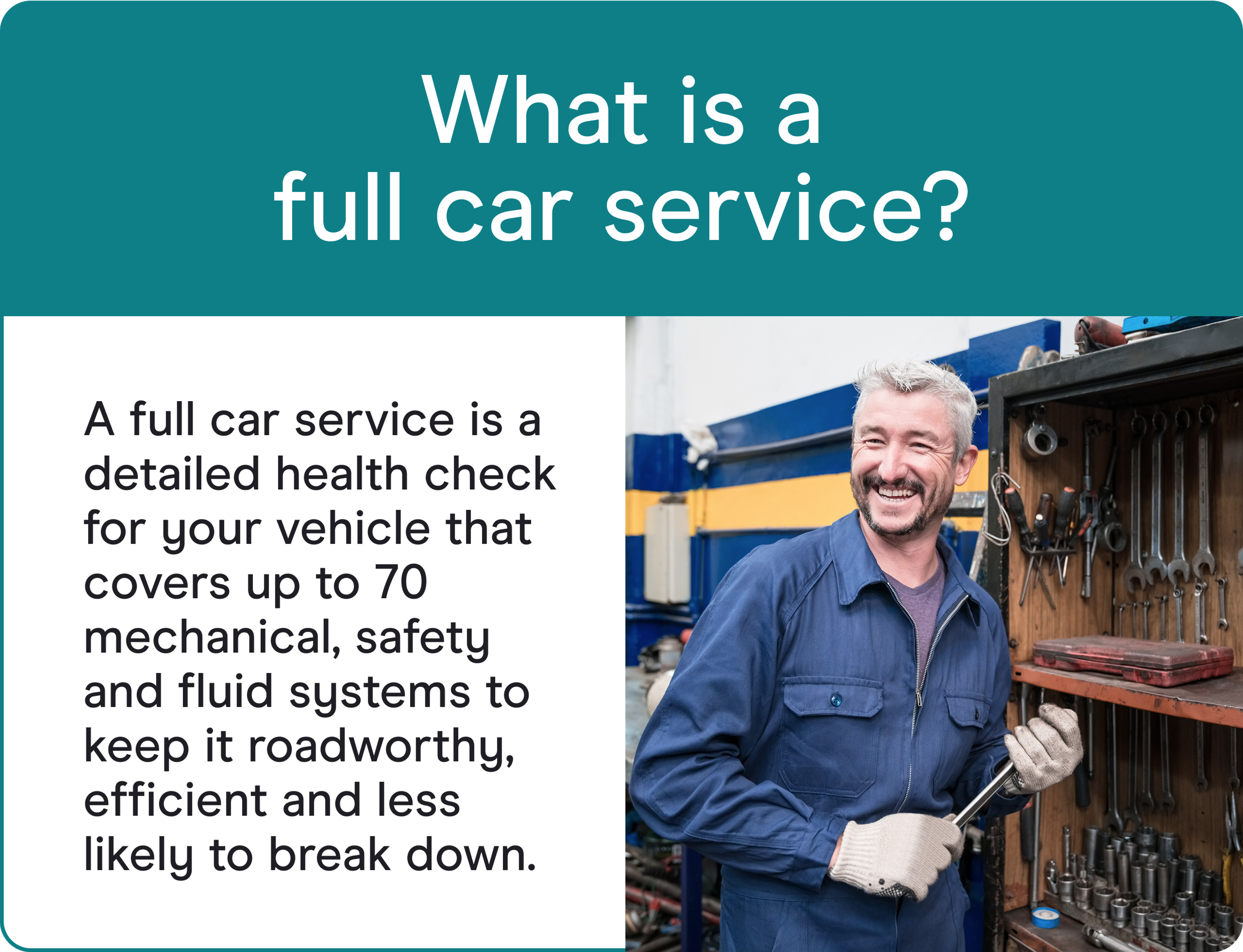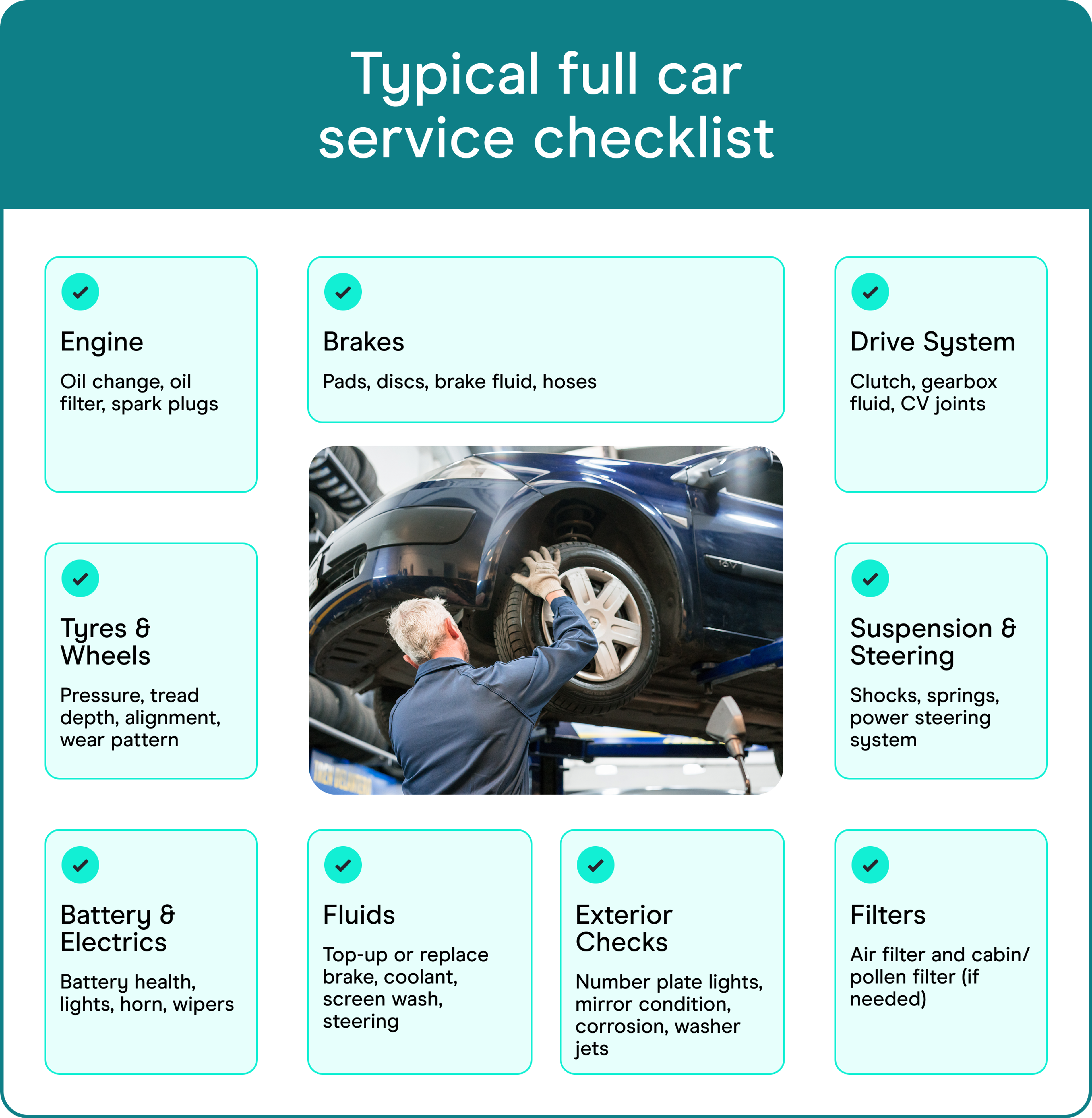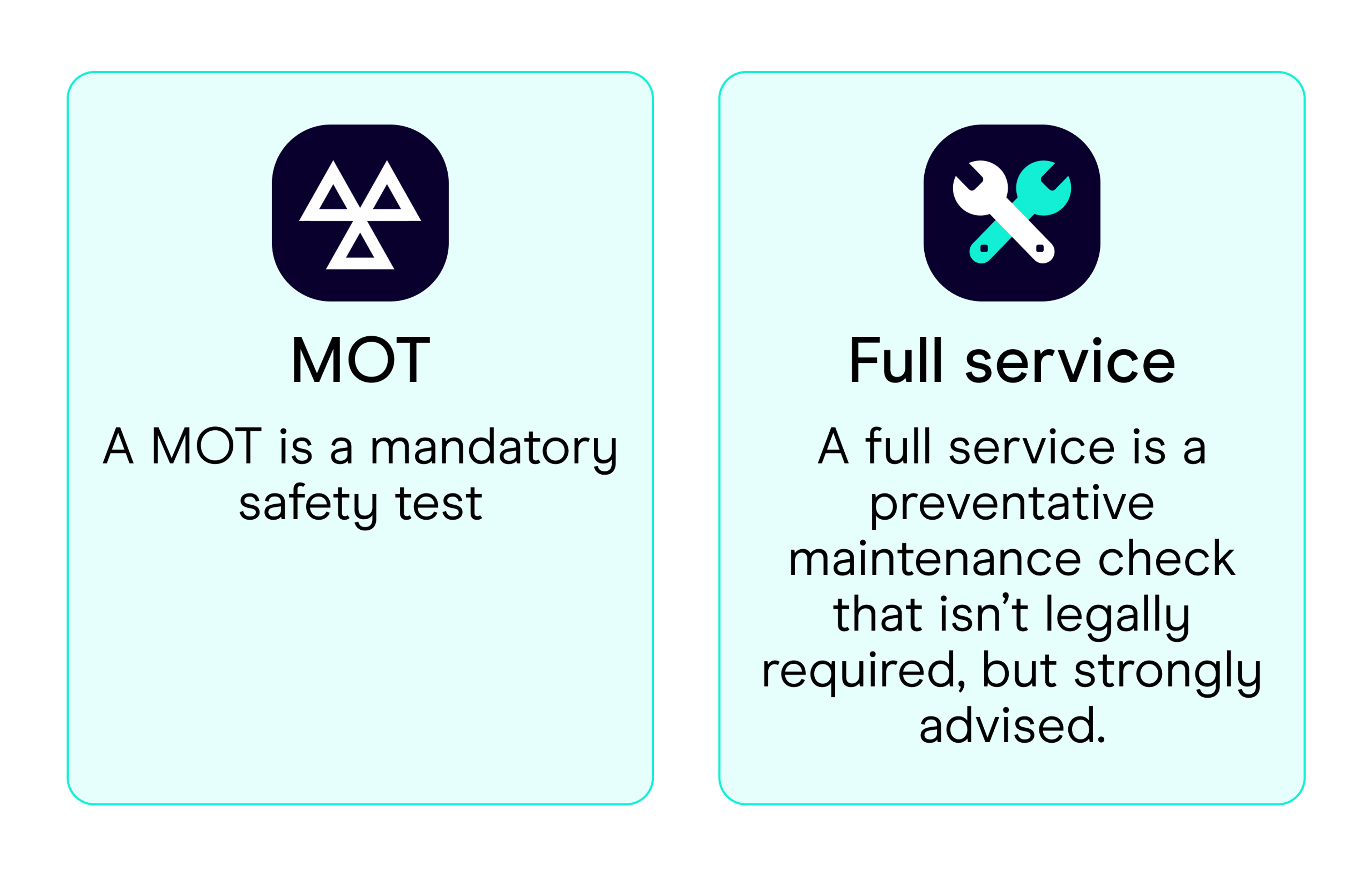A full car service is a detailed health check for your vehicle that covers up to 70 mechanical, safety and fluid systems to keep it roadworthy, efficient, and less likely to break down.

Think of it like a proper annual check-up for your car, not just a quick once-over. Unlike an MOT, which is a legal safety inspection, a full service is a voluntary but recommended maintenance process.
It ensures everything from your oil levels to your suspension is in good working order.
According to Statista, the UK motor vehicle maintenance and repair industry is projected to generate approximately $36.25bn in revenue in 2025, highlighting the scale and importance of regular servicing.
Most garages offer three service options to choose from:
- Interim service (every 6 months or 6,000 miles)
- Full service (annually or every 12,000 miles)
- Major service (every 24 months or 24,000 miles)
While terms and prices can vary slightly between garages, the table below gives you a general guide of what the differences are.

Type | Frequency | Legal requirement | Checks included | Estimated cost (UK) |
|---|---|---|---|---|
MOT | Annually (for cars over three years) | Yes | Basic safety and emissions | £40–£55 |
Interim | Every six months/6,000 miles | No | Approximately 35 checks (fluids, tyres, brakes) | £80–£125 |
Full Service | Every 12 months/12,000 miles | No | Approximately 50–70 checks across all systems | £150–£350 |
Still unsure if you need one? Imagine driving 12,000 miles without once checking your oil, tyres, or brake pads. That’s the risk you run without regular servicing, and the reason so many warranties, insurers, and even buyers ask to see a full service history.
According to road safety charity Brake, when asking drivers how regularly they perform safety checks on their vehicles, the answers were mixed. One third of drivers said they checked once a month, while a quarter (27%) stated that they perform safety checks just once a year. Around one in 10 stated they perform vehicle safety checks every time they use their vehicle (12%), and 9% stated they never perform vehicle safety checks.
The charity added that in spite of this, MOT results show that many drivers do not pay enough attention to routine maintenance: a third of cars, vans and passenger vehicles with up to 12 seats failed their initial MOT in 2018/19, and more than a quarter failed the final MOT.
What does a full car service include?
A full car service includes 50–70 checks, inspections, and part replacements across your car’s most important safety, performance, and wear-and-tear systems.
It's not just an oil change. It’s a full diagnostic, fluid flush, and roadworthiness review all in one. Most garages follow a structured checklist that ensures nothing is overlooked, from your tyre tread depth to your coolant concentration.
But no two garages are exactly the same. That’s why it’s helpful to understand what should be included, so you know you’re getting your money’s worth.
Volkswagen Financial Services research notes that a quarter (25%) of UK drivers admit to skipping their annual vehicle service due to cost, which compromises performance and increases the risk of breakdowns. Alarmingly, a further 18% said they’re likely to do so again in the next 18 months.

Does a full service ‘fix stuff’?
That depends. A full service will highlight what needs repairing or replacing, but unless it’s pre-agreed or minor, most garages won’t do the repairs during the service itself without your permission.
Think of the service as a diagnostic process. If it turns up worn brake pads or a leaking coolant hose, you’ll get a report or a call before any extra work is done.
Tip: Always ask to see the completed service checklist or get a digital summary. It’s useful for tracking issues and can even help with resale later on.
How often should you get a full service?
You should book a full car service every 12 months or 12,000 miles – whichever comes first.
This isn’t just a recommendation, but the standard advised by most manufacturers and mechanics. Why? Because critical wear-and-tear components like oil, brake fluid, and filters degrade over time, not just with distance. Even if you’ve barely driven, heat, moisture, and corrosion still creep in behind the scenes.
Mileage versus time: Why both matter
Your car doesn’t wait for a light to flash before it needs attention.
Scenario | Example | Service Timing |
|---|---|---|
High mileage driver | 1,000 miles a month (commuting, deliveries) | Every 10–12 months |
Low mileage driver | 4,000 miles/year (occasional weekend driving) | Every 12 months |
Mixed driving (short trips) | Frequent short journeys, school runs | Every 12 months |
Long-term parked/second car | Driven only a few times a year | Still annually |
Even parked cars develop problems like flat spots on tyres, battery drain, and stale fluids. A full service checks for these hidden issues.
How will you know it's time?
You’ll usually spot a service light on your dashboard (a little spanner or wrench icon). Some modern cars also track mileage and time to remind you. But if you’re driving an older vehicle or simply forgetful, put a yearly service in your calendar.
If you're buying or leasing a car, ask for its service schedule and history. And if you're insured, check your policy: some warranties or insurers may void cover for major faults if the car wasn’t serviced on time.
Do you have to pay a lot for a full car service?
The average cost of a full car service in the UK ranges from £170 for a small car, £210 for a medium car, and up to £395 for a large car as of March 2025, according to Check a Trade.
It’s not pocket change, but it can save you a fortune in the long run. Think of it like dental care for your car: prevention is cheaper than repair. Service pricing varies because not all cars require the same fluids, parts, or labour time. A diesel SUV with a complex turbo system, for instance, will cost more to service than a small petrol hatchback.
Car service type | Average UK cost |
|---|---|
Full service (small car) | £170 |
Full service (medium car) | £210 |
Full service (large car) | £395 |
Interim service | £110 |
Major service | £210 |
Oil and filter change | £100 |
Source: checkatrade.com/blog/cost-guides/car-service-cost/
Why is a full car service important?
A full service prevents costly repairs, improves fuel efficiency, extends vehicle life, and keeps your car safe.
Skipping a service might save money now, but it can cost thousands later. Small problems like low coolant or worn brake pads can become engine failures or brake system collapses if left unnoticed.

An MOT is a mandatory safety test. A full service is a preventative maintenance check that isn’t legally required, but strongly advised.
You can pass an MOT and still have low oil, a corroded battery, or worn spark plugs, all things an MOT doesn’t check.
Looking for car insurance?


